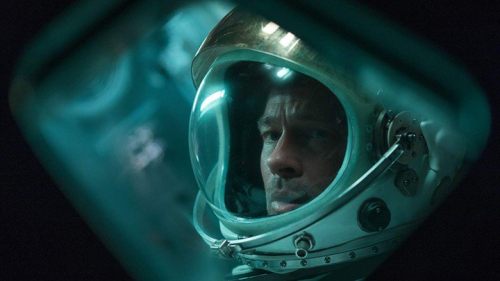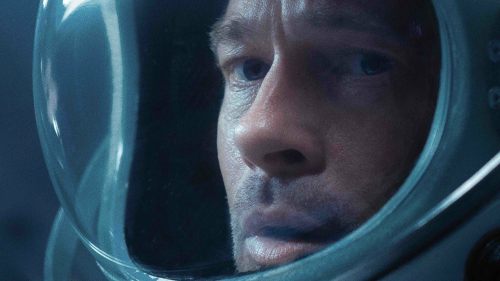Family, Fortune And Redemption: AD ASTRA And The Films Of James Gray
Ad Astra hits theaters this week. Get your tickets here!
The films of James Gray are unapologetically old-fashioned, as if they fell though a wormhole from some timeline in which the Golden Age of Hollywood wasn’t hamstrung by an imposed moral code. Intimate and deliberately-paced, they are nonetheless the work of a modern auteur deeply in love with cinema and its history, one not afraid to embrace melodrama, tragedy and ambiguity nor to trust his audience’s sophistication.
A science fiction epic about a man crossing the solar system to find his missing father and unravel a mystery which threatens humanity might seem an unlikely bedfellow for such films, but Ad Astra is exactly that movie. The premise is pure pulp, but allows Gray to engage with SF exactly as he already has with the gangster film, the bittersweet romcom, the pre-Code fallen woman parable and the biographical exploration epic, using genre as just another lens through which to examine the constant themes of his filmography.
James Gray emerged from film school fully-formed as a writer/director, his debut feature setting out ideas he would refine in two further Brooklyn-set modern gangster movies to form a loose trilogy less interested in turf wars than family dynamics and cycles of violence which turn prodigal son narratives inside out. An estranged hitman reconnects with his younger brother and their dying mother in Little Odessa (1994), but their abusive, philandering father’s sense of betrayal at the choices they have made lead him to in turn betray them, bringing about the exact destruction he accused his eldest of causing. When a patsy returns from jail but refuses to take another fall after a racket payoff goes wrong in The Yards (2000), the bond he shares with his cousin’s fiancé is torn apart both by disloyalty and the long shadow of the cousins’ teenage incest, slyly revealed by her stepfather. A nightclub manager who has distanced himself from his cop father and brother has to reconsider his loyalties when the operation they’re conducting against his mob masters unleashes cascading violence in We Own The Night (2007), but avenging his father’s death at the gangsters’ hands and reclaiming his identity costs him the woman he loves.
Family dynamics in Brooklyn are just as present in Two Lovers (2008), but its violence is purely emotional and largely self-inflicted. After a broken engagement, a lovelorn man finds himself torn between the business associate’s daughter with whom his parents have set him up and the vivacious but damaged new neighbor he yearns to rescue from her life of poor decisions, only to find this choice is not his to make.
Crossing the river and drawing on his grandparents’ stories of Manhattan’s 1920s underbelly, Gray fuses period cinema with period story while adding a new visual panache and a female protagonist in The Immigrant (2013). An innocent woman seeks a promised land of opportunity, but is separated from her sick sister before becoming caught between the affections of two feuding cousins from opposite sides of the entertainment world, enduring ruination and a crisis of faith as she attempts to reunite her family.
Leaving the streets of New York behind, The Lost City Of Z (2016) plunges into the dark heart of the Amazon, freeing Gray to explore new allegorical territory. After restoring the family honour squandered by his father’s debauchery, an explorer is consumed by tales of fortune and glory that drive a wedge between him, his peers, and his own family, but discovers that forging harmony with the native tribes of the jungle and reconciling with his son afford even greater riches.
Distilling them down to elevator pitches exposes the fascination Gray’s films display for people seeking destiny and identity, and specifically men who have been conditioned by society to bury emotions which subsequently erupt into violence for which they must atone, mapping classic Greek tragedy onto more modern stories and mythologies: We Own The Night is effectively a neo-Western, while the cousins of The Immigrant form a Biblical angel and demon pairing. With each film the scale of the communities Gray depicts steadily escalates, his work encompassing humanity more broadly with every step.
Close up, Gray’s characters aren’t stock heroes and villains but real, complex, flawed people who show rather than tell us who they are, meaty roles which attract actors of the highest calibre. Who gets to cast Vanessa Redgrave and Maximilian Schell in their debut, let alone Faye Dunaway, James Caan and Ellen Burstyn in its follow-up? These ensembles reward Gray’s writing with exquisite performances: Joaquin Phoenix plumbs his mercurial depths in four of Gray’s films opposite some of Mark Wahlberg’s best work, Jeremy Renner relishing a leading man role, a subtle early turn from Charlize Theron, a powerful, brittle Gwyneth Paltrow performance and a luminous display of silent-era guts and fragility from Marion Cotillard, an actor often ill-served by Hollywood, while Charlie Hunnam and Sienna Miller achieve career bests in Gray’s hands.
Critically acclaimed as Gray’s work is, box office success has been elusive: We Own The Night is his only real hit, and then largely on account of home video. It remains to be seen if Ad Astra, his most expensive film to date, can break this pattern, but its release at a time when major studios are contracting, consolidating and more nervous than ever of even mid-budget original films feels like Old Hollywood turning up to plea for the diversity of our future cinematic landscape and the auteur’s place within it.
With its action sequences and visual spectacle, Ad Astra offers blockbuster thrills but still reflects Gray’s preoccupations: a father and son in Tommy Lee Jones and Brad Pitt, a story fusing the classical legends of Icarus and Odysseus with the modern narratives of science fiction and Heart Of Darkness, a reconciliation in the heavens between two men imprisoned by emotional reticence which becomes the key to not just their survival, but that of the entire human race. Epic space opera it may be, but Ad Astra is no less a James Gray movie.



